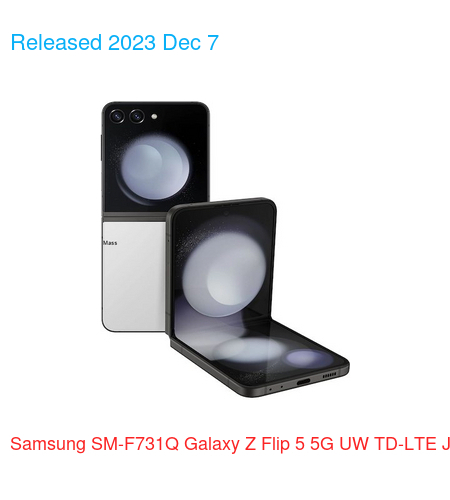| Brand | Samsung |
| Model | SM-F731Q Galaxy Z Flip 5 5G UW TD-LTE JP 512GB |
| Released | 2023 Dec 7 |
| Announced | 2023 Nov 25 |
| Hardware Designer | Samsung Electronics |
| Manufacturer | Samsung Electronics |
| Codename | Samsung B5 |
| OEM ID | F731QZUESJP |
| General Extras | Haptic touch feedback , Foldable screen |
| Device Category | Smartphone |
| Width | 71.9 mm |
| Height | 165.1 mm |
| Depth | 8.9 mm |
| Dimensions | 2.83×6.5×0.35 inches |
| Mass | 187 g |
| Platform | Android |
| Operating System | Google Android 14 (Upside Down Cake) |
| Software Extras | Voice Command , Business card recognition , Navigation software , Augmented Reality (AR) , Virtual Reality (VR) support , Intelligent personal assistant , Voice Recognition , Face Recognition |
| CPU Clock | 3360 MHz |
| CPU | Qualcomm Snapdragon 8 Gen 2 for Galaxy SM8550-AC (Kalama), 2022, 64 bit, octa-core, 8192 Kbyte L3, 4 nm, Qualcomm Adreno 740 GPU |
| RAM Type | LPDDR5X SDRAM |
| RAM Capacity (converted) | 8 GiB RAM |
| Non-volatile Memory Interface | UFS 4.0 |
| Non-volatile Memory Capacity (converted) | 256 GB ROM |
| Display Hole | 1-hole |
| Display Diagonal | 170.3 mm |
| Resolution | 1080×2640 |
| Horizontal Full Bezel Width | 7.42 mm |
| Display Area Utilization | 85.6% |
| Pixel Density | 425 PPI |
| Display Type | AM-OLED display |
| Display Subtype | Dynamic AM-OLED |
| Number of Display Scales | 16.8M |
| Display Refresh Rate | 120 Hz |
| Scratch Resistant Screen | No |
| Secondary Display Diagonal: | 86.1 mm |
| Secondary Display Resolution | 748×720 |
| Secondary Display Pixel Density (dot pitch): | 306 PPI |
| Secondary Display Type: | AM-OLED 2nd display |
| Secondary Number of Display Colors/Scales: | 16.8M |
| Scratch Resistant Sec. Screen: | Gorilla Glass Victus 2 |
| Secondary Display Refresh Rate | 60 Hz |
| Graphical Controller | Qualcomm Adreno 730 |
| GPU Clock: | 719 MHz |
| A/V Out | No |
| Microphone(s) | 3 |
| Loudspeaker(s): | stereo |
| Audio Output: | USB Type-C |
| Supported Cellular Bands | GSM850 , GSM900 , GSM1800 , GSM1900 , UMTS2100 (B1) , UMTS850 (B5) , LTE2100 (B1) , LTE1900 (B2) , LTE1800 (B3) , LTE1700/2100 (B4) , LTE850 (B5) , LTE2600 (B7) , LTE900 (B8) , LTE700 (B12) , LTE700 (B13) , LTE800 (B18) , LTE800 (B19) , LTE800 (B20) , LTE1500 (B21) , LTE850 (B26) , LTE700 (B28) , TD-LTE2600 (B38) , TD-LTE1900 (B39) , TD-LTE2300 (B40) , TD-LTE2500 (B41) , TD-LTE3500 (B42) , LTE1700/2100 (B66) , NR2100 (N1) , NR1800 (N3) , NR850 (N5) , NR700 (N28) , TD-NR2500 (N41) , NR1700/2100 (N66) , TD-NR3700 (N77) , TD-NR3500 (N78) , TD-NR4700 (N79) , TD-NR28G (N257) bands |
| Supported Cellular Data Links | GPRS , GPRS C12 , EDGE , EDGE MSC12 , UMTS , HSUPA , HSUPA 5.8 , HSDPA , HSPA+ 21.1 , DC-HSDPA 42.2 , LTE , LTE 100/50 , LTE 150/50 , LTE 300/50 , LTE 300/75 , LTE 450/50 , LTE 600/50 , LTE 1600 , NR 1500 , NR 2600 , NR 3700 , NR 4600 data links |
| SIM Card Slot | e-SIM , Nano-SIM (4FF) |
| Complementary Phone Services | Voice transmission , Voice speaker , Vibrate , Speakerphone , ANC , HD Voice , VoLTE , ViLTE |
| SAR (head) | 0.907 W/kg |
| SAR (body) | 0.738 W/kg |
| Sec. Supported Cellular Networks: | No |
| Touchscreen Type | Capacitive multi-touch screen |
| Expansion Interfaces | No |
| USB | USB 3.0 / 3.1 Gen 1 / 3.2 Gen 1×1 |
| USB Services | USB charging , USB fast charging , USB Host , USB OTG 1.3 , USB OTG 2.0 , USB PD , USB PD 2.0 , USB PD 3.0 , USB PD 3.1 |
| USB Connector | USB C reversible |
| Max. Charging Power | 25.0 W |
| Bluetooth | Bluetooth 5.3 |
| Wireless LAN | 802.11a , 802.11b , 802.11g , 802.11n , 802.11ac , 802.11ax |
| Wireless Services | DLNA , Miracast , Wi-Fi Direct , Wi-Fi Tethering , Wi-Fi Calling |
| NFC | NFC A , NFC B , FeliCa |
| FM Radio Receiver | FM radio (76-108 MHz) with RDS |
| Complementary Satellite Services | Simultaneous GPS , A-GPS , Geotagging , QuickGPS , QZSS |
| Supported GLONASS protocol(s) | L1OF |
| Supported Galileo service(s) | E1 |
| Supported BeiDou system (BDS) | B1I BeiDou receiver |
| Camera Placement | Rear |
| Camera Image Sensor | BSI CMOS |
| Image Sensor Pixel Size | 1.80 micrometer |
| Number of effective pixels | 12.0 MP camera |
| Aperture (W) | f/1.80 |
| Zoom | 1.0 x optical zoom |
| Focus | PD AF |
| Min. Equiv. Focal Length | 24 mm |
| Video Recording | 3840×2160 pixel |
| Flash | single LED |
| Camera Extra Functions | EIS (video) , OIS , HDR photo , HDR video , Red-eye reduction , Slow motion video , Burst mode , Refocus , Touch focus , Macro mode , Panorama Photo , Face detection , Face tagging , Smile detection , Face retouch , Face retouch (video) , Intelligent scene detection |
| Aux. Camera Image Sensor | BSI CMOS |
| Aux. Cam. Image Sensor Pixel Size | 1.12 micrometer |
| Aux. Camera Number of Pixels | 12.0 MP aux. cam |
| Aux. Camera Aperture (W) | f/2.20 |
| Aux. Cam. Min. Equiv. Focal Length | 13 mm |
| Aux. Camera Extra Functions | HDR photo , HDR video , Burst mode , Panorama Photo , Face detection , Face tagging , Smile detection , Face retouch , Intelligent scene detection |
| Aux. 2 Camera Image Sensor | No |
| Aux. 3 Camera Image Sensor | No |
| Aux. 4 Camera Image Sensor | No |
| Secondary Camera Placement | Front |
| Secondary Camera Sensor | BSI CMOS |
| Secondary Camera Number of pixels | 10.0 MP sec. cam |
| Secondary Aperture (W) | f/2.20 |
| Secondary Video Recording | 3840×2160 pixel |
| Secondary Camera Extra Functions | EIS , EIS (video) , HDR photo , HDR video , Slow motion video , Burst mode , Panorama Photo , Face detection , Face tagging , Smile detection , Face retouch , Face retouch (video) , Intelligent scene detection |
| Sec. Aux. Cam. Image Sensor | No |
| Built-in compass | 3D compass |
| Built-in accelerometer | 3D accelerometer |
| Built-in gyroscope | 3D gyro |
| Additional sensors | Barometer , FP sensor , Hall , L sensor , P sensor |
| Protection from solid materials | Non-standard protection |
| Protection from liquids | 8 Protected against immersion beyond 1m of depth |
| Immersion into liquids (depth limit) | 150 cm |
| Immersion into liquids time limit | 30 min |
| Battery | Li-ion |
| Battery Cells in Parallel | Yes |
| Nominal Battery Voltage | 3.88 Volts |
| Nominal Battery Capacity | 3700 mAh battery |
| Nominal Battery Energy | 14.36 Wh |
| Estimated Battery Life | 17.0 hours |
| Talk Time: | 35.0 hours |
| Wireless Charging | Qi |
| Max. Wireless Charging Power | 15.0 W |
| Market Countries | Japan |
| Market Regions | Asia |
| Mobile Operator | Rakuten Mobile |
| Price | 179900 unknown |
Specifications data description of this 📱Samsung SM-F731Q Galaxy Z Flip 5 5G UW TD-LTE JP 512GB📱
Title: The Ultimate Specification Guide for Your Device 🌐📅🏋️🌈🤖🛠️🚀🔧💪🖥️🎮💻🧠🗂️📷🎥🔈📡📶💡🎁🔋🔌
Introduction
————
Are you looking to purchase a new device but are unsure about the technical specifications? Look no further! This guide will provide you with a comprehensive overview of the most important device specifications, complete with Emoji icons for easy reference.
Lineup
——
When it comes to devices, there are various options available on the market. Here are some of the most popular ones:
* Smartphones
* Tablets
* Laptops
* Desktops
Design
——
The design of a device is just as important as its specifications. A well-designed device should be ergonomic, aesthetically pleasing, and functional.
Specifications
————–
Here are the specifications you should consider when purchasing a new device:
🌐 NETWORK: The device’s network capability is crucial for staying connected. Look for a device with support for 4G LTE or 5G networks for the best performance.
📅 LAUNCH: The launch date of a device can impact its price and availability. It’s essential to consider whether you want the latest and greatest or a more established device.
🏋️ BODY: The physical attributes of a device, such as weight, size, and build quality, can greatly impact its usability.
🌈 DISPLAY: The display is one of the most critical components of a device. Look for a device with a high-resolution screen, wide color gamut, and good brightness levels.
🤖 OS: The operating system (OS) of a device is its software foundation. Popular mobile OS options include Android and iOS, while desktop OS options include Windows, macOS, and Linux.
🛠️ CHIPSET: The chipset is the brain of the device and determines its overall performance. Look for devices with powerful chipsets for the best experience.
💪 CPU: The central processing unit (CPU) is responsible for processing data and executing commands. A faster CPU means a more responsive device.
🖥️ GPU: The graphics processing unit (GPU) is essential for games and graphics-intensive applications. Look for devices with powerful GPUs for the best performance.
🎮 MEMORY: Memory (RAM) is crucial for multitasking and running multiple applications. More RAM means a more responsive device.
🗂️ STORAGE: Storage is where the device saves files, applications, and data. Look for devices with large storage capacities for the best experience.
📷 CAMERA: The camera is an essential component of a device, especially for smartphones. Look for devices with high-resolution cameras and advanced features like optical image stabilization.
🎥 VIDEO: The video capabilities of a device are crucial for video recording and playback. Look for devices with advanced video features like 4K resolution and high frame rates.
🔈 SOUND: The sound quality of a device is vital for media consumption. Look for devices with high-quality speakers and audio processing features.
📡 CONNECTIVITY: Connectivity options, such as Bluetooth and Wi-Fi, are essential for connecting to external devices.
📶 NETWORK: The network capabilities of a device are crucial for staying connected. Look for devices with support for 4G LTE or 5G networks for the best performance.
💡 FEATURES: Additional features like fingerprint scanners, facial recognition, and water resistance can add value to a device.
🎁 ACCESSORIES: Accessories like cases, screen protectors, and chargers are essential for protecting and enhancing the device.
🔋 BATTERY: The battery life of a device is crucial for its usability. Look for devices with long battery life and fast charging capabilities.
Conclusion
———-
Choosing the right device can be a daunting task, but this guide has provided you with a comprehensive overview of the most important device specifications. Keep in mind that the best device for you depends on your specific needs and preferences.
We invite you to leave a comment below and share your thoughts on this guide. Did we miss anything? What other specifications do you consider when purchasing a new device? We’d love to hear from you!














